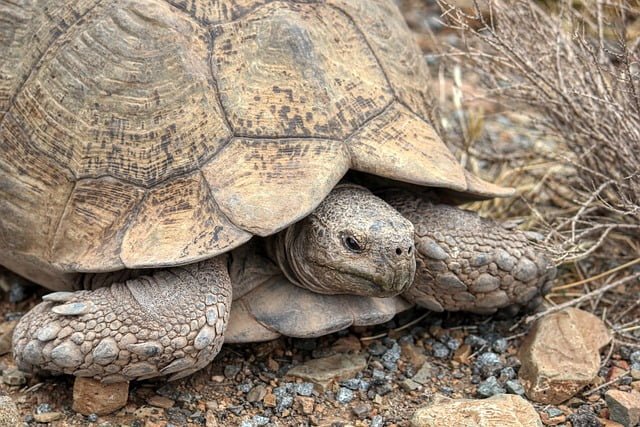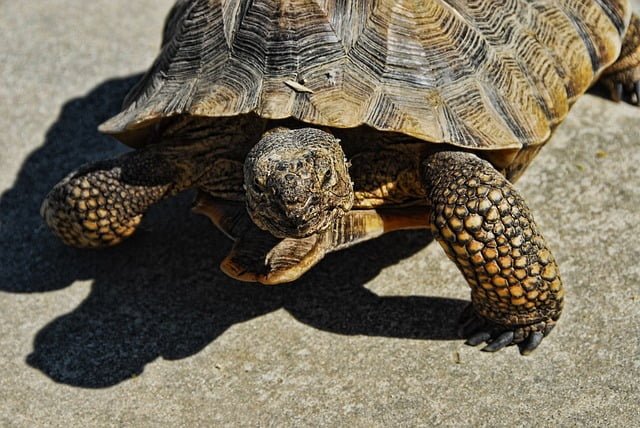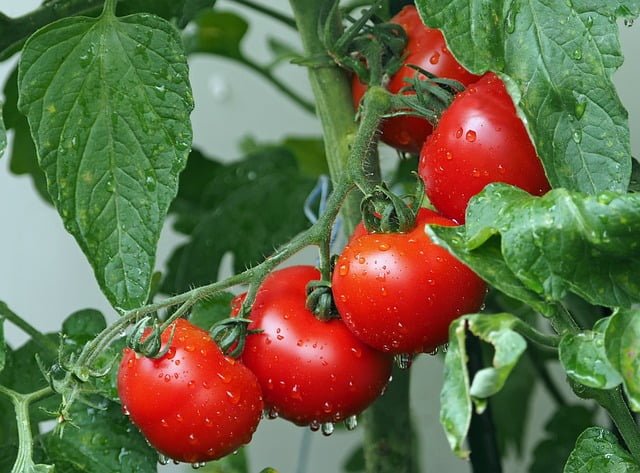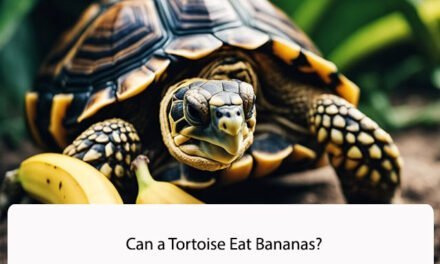Desert tortoises are fascinating creatures that have adapted to survive in harsh, arid environments. As herbivores, they mainly feed on a variety of plants, including cacti, wildflowers, and grasses. However, many tortoise owners wonder if they can feed their pets other types of vegetation, such as tomatoes.
Tomatoes are a common household vegetable that are often used in salads, sandwiches, and other dishes. While they are safe for humans to eat, it’s important to consider whether they are suitable for desert tortoises. In this article, we will explore the question of whether desert tortoises can eat tomatoes and provide you with the information you need to make an informed decision about your pet’s diet.

Understanding Desert Tortoises
Habitat and Lifestyle
Desert tortoises are found in the southwestern United States and parts of Mexico. They are primarily found in the Mojave and Sonoran Deserts. They prefer to live in areas with sandy or gravelly soil, and they dig burrows to escape the heat of the day and to hibernate during the winter.
Desert tortoises are solitary creatures and spend most of their time alone. They are most active during the early morning and late afternoon, when the temperature is cooler. They are known for their slow movement and can walk up to 0.3 miles per hour.
Dietary Preferences
Desert tortoises are herbivores and eat a variety of plants. Their diet consists mainly of grasses, herbs, and wildflowers. They also eat cactus pads, fruits, and berries when they are available. They are known to eat up to 200 different plant species.
It is important to note that desert tortoises have specific dietary requirements and can suffer from malnutrition if they do not receive the proper nutrients. They require a high-fiber, low-protein diet with a calcium-to-phosphorus ratio of 2:1.
While tomatoes are not toxic to desert tortoises, they are not a natural part of their diet and should not be fed to them regularly. Tomatoes are high in sugar and acid, which can cause digestive problems for tortoises. It is best to stick to their natural diet and feed them a variety of grasses and plants that are found in their natural habitat.
Overall, understanding the habitat and dietary preferences of desert tortoises is important in providing them with the proper care and nutrition they need to thrive in captivity or in the wild.
Can Desert Tortoises Eat Tomatoes
Nutritional Value of Tomatoes
Tomatoes are a good source of vitamins and minerals, including vitamin C, potassium, and folate. They also contain antioxidants such as lycopene, which may help protect against cancer and heart disease. However, tomatoes are also high in acidity and may cause digestive issues in some animals.
Potential Risks
While tomatoes are generally safe for human consumption, they may not be suitable for desert tortoises. Tomatoes are part of the nightshade family, which contains solanine, a toxic substance that can cause gastrointestinal upset, lethargy, and even death in some animals.
In addition to solanine, tomatoes are also high in oxalates, which can bind with calcium and cause kidney stones in some animals. Desert tortoises are prone to kidney issues, and feeding them foods high in oxalates can exacerbate these problems.
Furthermore, the high acidity of tomatoes can cause digestive issues in desert tortoises, leading to diarrhea and dehydration.
In conclusion, while tomatoes may seem like a healthy treat for desert tortoises, they should be avoided due to their potential risks. It is important to provide these animals with a balanced diet that meets their nutritional needs without compromising their health.
Healthy Diet for Desert Tortoises
Recommended Foods
When it comes to feeding desert tortoises, it is important to provide them with a balanced diet that meets their nutritional needs. Here are some recommended foods that can be included in their diet:
- Grasses: Desert tortoises are herbivores and require a high-fiber diet. Grasses such as Bermuda grass, alfalfa, and clover can be fed to them.
- Leafy Greens: Leafy greens such as kale, collard greens, and dandelion greens are also good for desert tortoises. These greens are rich in vitamins and minerals that are essential for their growth and overall health.
- Vegetables: Vegetables such as carrots, squash, and sweet potatoes can also be included in their diet. These vegetables are a good source of vitamins and minerals that are important for their health.
- Fruits: Fruits such as apples, pears, and melons can be fed to desert tortoises in moderation. These fruits are a good source of vitamins and minerals, but they are also high in sugar, so they should be fed in moderation.
Foods to Avoid
There are some foods that should be avoided when feeding desert tortoises. These include:
- High-Protein Foods: Desert tortoises do not require a high-protein diet. Foods such as meat, eggs, and dairy products should be avoided as they can cause health problems.
- Processed Foods: Processed foods such as bread, crackers, and chips should also be avoided. These foods are high in carbohydrates and can cause digestive problems.
- Foods High in Oxalates: Foods such as spinach, beet greens, and rhubarb should be fed in moderation as they are high in oxalates. Oxalates can bind with calcium and prevent it from being absorbed, which can lead to health problems.
In conclusion, providing a healthy and balanced diet is essential for the health and well-being of desert tortoises. By including recommended foods and avoiding certain foods, we can ensure that our desert tortoises are healthy and happy.

Monitoring Your Desert Tortoise’s Diet
As responsible pet owners, we must always monitor our desert tortoise’s diet to ensure that they are getting the right nutrients and not overeating. Here are some tips on how to monitor your desert tortoise’s diet:
- Keep a food journal: Keeping a food journal can help you keep track of what your desert tortoise is eating, how much they are eating, and how often they are eating. This can help you identify any patterns or changes in their eating habits.
- Weigh your tortoise: Regularly weighing your tortoise can help you monitor their weight and ensure that they are not gaining or losing too much weight. A healthy adult desert tortoise should weigh between 8-15 pounds.
- Observe their behavior: Pay attention to your tortoise’s behavior after they eat. Are they active and alert or lethargic and sluggish? This can give you an idea of how well they are digesting their food.
- Offer a variety of foods: Desert tortoises are herbivores, and their diet should consist of a variety of vegetables, fruits, and grasses. Offer a variety of foods to ensure that they are getting all the nutrients they need.
- Limit treats: While it’s okay to offer your tortoise treats like tomatoes occasionally, it’s important to limit their intake. Too many treats can lead to obesity and other health problems.
By following these tips, we can ensure that our desert tortoises are healthy and happy.
Conclusion
Based on our research, we have found that desert tortoises can eat tomatoes, but it should not be a significant part of their diet. Tomatoes are not toxic to tortoises and can provide some nutritional benefits, such as vitamin C and lycopene. However, tomatoes are also high in acid and sugar, which can cause digestive issues and potentially harm the tortoise’s health if consumed in large quantities.
It is important to note that tortoises have specific dietary requirements, and their diet should consist primarily of grasses, hay, and leafy greens. Fruits and vegetables should be given in moderation as treats or supplements. A diet that is too high in fruits and vegetables can lead to health problems such as shell deformities and metabolic bone disease.
If you choose to feed your desert tortoise tomatoes, it is important to do so in moderation and as part of a balanced diet. We recommend consulting with a veterinarian or reptile specialist to ensure that your tortoise’s dietary needs are being met.

Frequently Asked Questions
What vegetables are safe for desert tortoises to eat?
Desert tortoises are herbivores and consume a variety of vegetables. Safe vegetables include collard greens, mustard greens, turnip greens, dandelion greens, and kale. They can also eat carrots, squash, and sweet potatoes.
Are tomatoes safe for red footed tortoises?
Tomatoes are not recommended for red footed tortoises, as they contain high levels of acid. This can cause digestive problems and shell deformities.
What foods should be avoided when feeding a desert tortoise?
Foods that should be avoided include iceberg lettuce, spinach, and rhubarb. These vegetables contain high levels of oxalic acid, which can prevent calcium absorption and lead to metabolic bone disease.
Can Russian tortoises consume tomatoes?
Russian tortoises can consume tomatoes in moderation, but it is not recommended as a regular part of their diet. Tomatoes contain high levels of acid, which can cause digestive problems.
Is it safe for desert tortoises to eat peppers?
Peppers are safe for desert tortoises to consume, but only in small amounts. They contain high levels of vitamin C, which can cause diarrhea if consumed in excess.
What fruits are safe for tortoises to consume?
Safe fruits include apples, bananas, strawberries, and melons. Fruits should be given in moderation, as they contain high levels of sugar.





